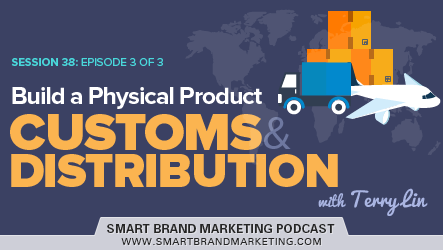Podcast: Play in new window | Download | Embed
Today’s Guest
Another Episode in the books!
Terry Lin joins the 38th session of Smart Brand Marketing.
This week is the last chapter of the 3 part series where we chat about how to build a physical product and create our own brand. We talk about mass sourcing, customs and distribution.
TOPICS DISCUSSED
Payment, shopping around, customs, packaging.
Enjoy!
Logistics and How to Manage it Properly for Your Business
Picture this: you have already a winning business idea and you have set up a rather efficient system to turn that idea into something tangible. Now, the question is how are you going to deliver all of that into your markets?
The act of moving all of your products from one place to another is a task that, well, requires a meticulous approach as they are quite complex and ever-changing as it is. This is why you should develop a strong understanding of how logistics works.
Why is Logistics Important to Supply Chains?
Moving your products from point A to point B should be easy, right? All you need to do is hire a delivery service that is going to do everything for you and, boom, you’re done. The truth is that logistics is more than that.
As a matter of fact, logistics is not concerned really with the movement of products from place to place because that is already a given in any business and industry. What it deals with, however, is in the finding of ways to make the delivery of said materials even more efficient for everyone involved in the supply chain.
Proper logistics management should help your business in a number of ways which include:
-
1. Getting Results

The one mistake that a lot of business owners think is that logistics is just this “big-business” matter which means they don’t have to worry about it until they reach a considerable size. The truth of the matter is that logistics has always been there from the very beginning of the business. It only gets more complex the more your business expands its scope.
Logistics is there to help you plan how to move your products and materials in a timely and efficient manner. After all, your customers are always expecting for you to get things done in a timely and accurate way. The more you can deliver on your business’s promises, the more it will earn from the market.
-
2. Creating Value

For customers, value is more than just about quality and quantity. It also involves availability. Simply put, are your products there whenever they need it or, on the distributor’s part, arriving on time to meet the demands of their clients?
Proper logistics management should help you deliver on your promises on time which should allow your business to meet the demands of the market. If your products can be there when your customers need it, then there is some value of sorts in it which should improve your competitiveness in the market.
-
3. Improving Efficiency and Reducing Costs

As was stated, your supply chain increases in complexity the bigger your business grows. Soon enough, the margin for error for your businesses lessens which means that you are bound to make costly mistakes in delivering your products unless you manage your supply chain properly.
The number of options available for you to meet the demands of your growing market are quite numerous and this includes investing on new delivery systems or outsourcing your transportation and warehousing to someone else. The point is that a careful integration of new systems and strategies to meet the demands of your market should allow you to deliver your products on time, regardless of your target market is local or scattered across the globe.
How to Do Logistics Right
Understanding why logistics is important to your business will not be enough. You should also properly implement strategies that will allow your business to move products from every point of the chain with minimal costs and risks. There are a number of ways to do this and below are just some of the more effective ones in recent years that you should know of.
-
1. Plan Everything

This can be a no-brainer for many but you’d be surprised as to how many entrepreneurs tend to not plan for their logistics since it’s not exactly one of the more labor-intensive aspects of management. Planning for your logistics will encompass a wide array of factors which include the procurement of basic materials, the channels where materials and products are going to be delivered at, the different points or phases they will go through, and their final destination.
Aside from that, there are technical aspects to consider including delivery time, transportation to be used, and, of course, costs. These three are actually interdependent and tend to become more elaborate the larger the volume of products you have to ship regularly.
Now, planning for things that are within your control is expected by what separates the best logistics managers from the rest is the ability to anticipate for the unexpected. When it comes to logistics, you should prepare for unforeseen circumstances which include.
- Damages to the products
- Unavailability of certain channels and transportation methods.
- Issues with production and other internal aspects in your business.
With that in mind, you should have contingencies set in case any part of the supply chain fails. Some managers even have contingencies in case their contingencies also fail. After all, you can never be too cautious when it comes to delivering products. -
2. Automation

Whenever business owners hear the word “automation”, they immediately think of “robots”. That is not exactly true. In this day and age, you don’t have to do everything manually as there are software that can do that for you.
As of now, there are a number of software out there designed to perform a number of key logistics tasks including:
- Monitoring the loading and shipping of products.
- Track the delivery of products to the different distribution sites.
- Process orders from clients.
- Order for the procurement of products from the warehouse.
- Checking on available supplies.
- Notify management of missing or damaged shipping batches.
- Formulate work schedules and assign tasks to employees based on it.
Not will automated software increase the pace of production and shipping on your part, it also severely reduces the occurrence of error made from manual interference. Of course, you’d have to get your employees trained to use these programs but, in the long run, they should help your business manage the entire supply chain on a technical level for you. -
3. Mind Your Staff

The one thing that you would have to remember with your supply chain is that, even if it is composed of various mechanical and digital systems, you would still have to put the right kind of people to handle several parts of the chain. From the top management to warehouse managers and even delivery crews, everyone that you employ for the chain should be the best person to handle those kinds of work.
As such, you need to invest in the proper training of your employees. There are a number of workshops out there that will help keep your employees keep up with the most recent trends and practices in the industry and they, of course, will entail costs. On your part, you should also try to learn new things in the industry so you remain an authority of sorts in it. This will actually help you in anticipating for changes in the market as well as tap into new markets.
-
4. Measure, Integrate, and Improvise

Truth be told, a logistics system is not complete without analysis, measurements, and feedback. Before you execute new strategies in your logistics management system, you need to find determine the output first and compare this to your goals.
Your ability to analyze metrics would also come into play especially in the fields of production cycle times, cost, and service quality. It would also help if you listen to feedback from your staff when implementing new strategies and even your customers. This will make sure that you have a wide pool of information to draw from while also giving you new perspectives that can help you accurately address any flaw in the system.
Customs: Why Do We Have to Deal with It?
Eventually, your products would reach the global market which means that you would have to add one more factor to your supply chain: the customs department of every nation your products will be distributed to regularly.
By concept, a customs agency is there to filter every item that the nation imports from across the globe to make sure that they are safe to distribute in that nation’s markets. It’s kind of like border patrol but dealing more with commodities than people.
So why do your products have to go through customs officials first. There are three main reasons why.
-
1. National Security

Nothing against your products but a customs agency will have to make sure that no contraband ever passes through them in the name of securing its borders. There are far too many instances in the past where things like weapons, drugs, and even radioactive materials where shipped with otherwise harmless items.
The temptation to pass items deemed illegal in that nation’s government is just too strong when it comes to imports so it’s the duty of customs to check all shipments coming to the nation without prejudice. Just keep in mind that customs do this not because they think that your shipments pose a threat to the country but there might be something there that could.
-
2.Health and Sanitation

This is something that is exclusive to food items, agricultural products, and other products made from biological matter. Things like food, grain, and plants tend to carry small microorganisms which can pose a threat to the populace. After all, pandemics like the Bubonic Plague started just because of rats that stowed away in shipping crates centuries ago.
Also, it’s a government’s task to ensure that whatever their populace consumes is safe. Customs officials, as such, have the power to declare if something is unsanitary or hazardous which makes it unsafe for distribution.
-
3. Taxation

Now we come to the most pressing of reasons why customs exist. Every nation has a government and those governments have the power to tax everything within the country or coming to it; and that includes your products. This is important as the things that make your product will determine whether or not there are import duties have to be paid for it and how much.
This is why some of your shipments will have to be stored first at the customs’ warehouse. This can take from a few weeks to months but there is a push right now for digital solutions to make the process faster and efficient. In this regard also, customs can make tax reviews on foreign companies based on their paperwork and diligence in paying their dues for the shipments. If you can pay for the taxes of your products quickly, then they won’t be hold at the customs warehouse for too long; at least in theory.
Dealing with Customs
More often than not, a customs agent is the final hurdle your product has to pass through before reaching the end-user on a different market. Also, it goes without saying that dealing with anyone from customs can range from problematic to downright stressful depending on that country’s import policies.
One thing you’d have to understand, though, is that customs is a purely political matter. As a business person, you can’t do anything with it without negatively affecting your international operations.
Due to this, the best strategy you’d have to use with customs is to keep a low profile. From shipping in moderately sized crates to following the import laws of that country, any measure that can help your products avoid unnecessary attention from customs officials will make sure that your products will reach their intended distribution points as soon as possible.
In Conclusion
As was discussed, your supply chain is something that gets more complicated the wider your operations become. However, that does not mean that it will reach a point that it becomes too complicated for you to run.
What is necessary here is that you maintain a cautious yet decisive approach in expanding your distributions while also dealing with any unexpected scenario that comes along the way. If you do it right, you might end up with a supply chain that can sustain itself for as long as possible.
Have you encountered problems with the distribution of your products? What measures have you employed to get your products from points A to B as quickly as possible. Let us know in the comments below.
References:
https://cerasis.com/2017/05/12/effective-logistics-management/
https://www.macocustoms.com/nl/node/852
RESOURCES
- DC
- John Lawson (Episode)
- Brendan Tully (Episode)
- Build My Online Store
- Baller Wallet
THANK YOU FOR LISTENING!
To get more SBM content sent directly to your device as they become available, you can subscribe on iTunes or Stitcher!
Also, reviews on iTunes are extremely helpful and greatly appreciated! I read each and every one of them, and feel free to share your URL there so I can contact you later on and say thanks!
If you enjoyed this episode you may also love listening to:



